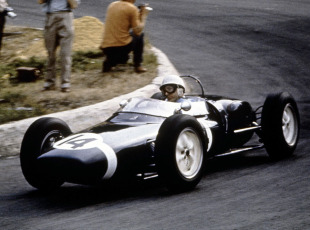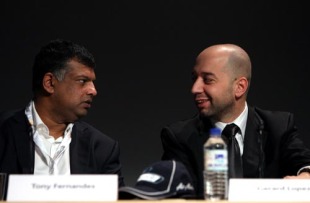
It's been hard to escape the on-going battle over the Lotus name in recent weeks. Like many of you, I've found the whole situation rather tedious, but sadly it's symptomatic of Formula One today.
A lot has been written about who has the right to use the Lotus name and both sides have fairly convincing cases. The arguments have been trotted out several times before so I won't repeat them here. Instead I thought I'd look at what I remember of the original Team Lotus, both the good bits and the bad.
So what does Lotus mean to me? Well to be honest, it means wheels coming off and overly sensitive cars. It's an important name from the past, but for me it really didn't compare with the likes of Ferrari, Mercedes or Alfa Romeo. Certainly as a driver I would have been far more excited about being invited to drive for Alfa or Mercedes than I would for Lotus, a team that had only just started out in Formula One at that time.
Nowadays people think of Lotus and the championships they won, but those of us that knew - when I raced at least - said, "Christ, they were a bit dodgy". I raced Rob Walker-prepared Lotuses in the 1960s and unbeknown to me Rob was changing the stub axles after every race because they were so close to the limit. If the machinist at the factory just cut them a fraction to slim then you'd have a weak one and usually a bloody big accident at the next race.
I think Colin Chapman pushed the limits too far with some of the cars and at times that didn't seem necessary. One had to use one's concentration to keep away from the thought of what might happen, and that was the biggest cross one had to carry when driving a Lotus. Colin was a brilliant engineer but just ran it too close too often in the early days, although the later cars were much safer.
The Lotus name is still evocative today because the cars were quick and that attracted the big-name drivers - that was what mattered to Colin. But I think when a wheel came off, the bad news for him was that the car wasn't going to finish not that the driver might be hurt. He was a thick-skinned individual and that is also a trait you saw in Enzo Ferrari. Of course they were both very successful, but personally I didn't think the risk taking was necessary.

Lotus cars were never driver friendly like a Cooper or a Maserati, but they were fast and they won races. You'd never mess around in a Lotus and you had to drive it very precisely. In many respects that's a good thing, but if you're racing for three hours as we did in those days it was nice to drive something that wasn't quite so demanding.
Therefore the joy of driving a Lotus was not in the racing but in the winning, and that's the one thing Colin's cars were very good at. I look back on my races in a Lotus only with affection for the fact that I won some and I remember the sense of joy when seeing the chequered flag at the end of the race. Of course some of my greatest races were at the wheel of a Lotus, for example I have very fond memories of Monaco in 1961 where I held off the Ferraris for the whole three hours. But that was the good thing about Monaco - one was kept so busy with gear changes, turning the car in and getting on the power that one didn't have time to think about how difficult it was or how dangerous it was.
I also took Lotus' first victory at Monaco in 1960 driving the Rob Walker car, but to be honest that didn't mean that much to me and I don't think it meant much to Colin either. I'd have rather won it in a Cooper because John Cooper was much easier to get on with.
Having said all that, Colin was a truly brilliant engineer and put together winning cars. The Vanwall which won the 1958 constructors' championship was engineered by him and he turned that car into a winner, again not by making it easy to drive but by making it very quick. As Team Lotus they went onto win many championships long after I retired. They bought about many innovations in Formula One, which included the engineering in the race cars they built, the first commercial sponsorship and even the first team motor home known as HMS Hethel.

Unfortunately the current battle over the Lotus name is symptomatic of modern Formula One, which is now run as a business. In many ways Colin was a businessman and I think if he was alive today and wanted to sell the name, he would just sell it to the highest bidder. Personally I think one of the teams should come up with its own name and be proud of that rather than worrying about how much money can be made out of the old Lotus brand. There's much more of the original spirit of F1 in doing your own thing.
But sadly the days when there was a heart in racing are long gone and we can't go back. There's so much money to be made that it's no longer a sport and very few people are still involved for the enjoyment alone. I suppose that was always inevitable when television and advertising became involved.
As I've said before, when Lewis Hamilton wins a race he has to thank Vodafone whereas in my day I used to chase the crumpet. I know which era I'd rather race in.
© ESPN Sports Media Ltd.
 Sir Stirling Moss OBE - a British motor racing legend, recognised as one of the world's greatest racing drivers. He won an astonishing 212 of the 529 races he entered during his 15-year career, competing in just about every class of motor racing, including 16 Formula One races. His victory in the 1961 Monaco Grand Prix is one of the most famous races in F1 history. Stirling's vast experience comes from being a racer and from knowing those who compete in and run the sport now. He never shies away from commenting on all aspects of the sport he loves. Gallery of his career
Sir Stirling Moss OBE - a British motor racing legend, recognised as one of the world's greatest racing drivers. He won an astonishing 212 of the 529 races he entered during his 15-year career, competing in just about every class of motor racing, including 16 Formula One races. His victory in the 1961 Monaco Grand Prix is one of the most famous races in F1 history. Stirling's vast experience comes from being a racer and from knowing those who compete in and run the sport now. He never shies away from commenting on all aspects of the sport he loves. Gallery of his career

